The recession is going to have to get back in line and wait.
By Wolf Richter for WOLF STREET.
Retail sales in March jumped majestically, and January and February were revised higher, and it wasn’t just motor vehicle sales and tariff-frontrunning, or whatever, but also sales in restaurants and bars where sales jumped, a sign that consumers are splurging, not frontrunning. They’re in a foul mood in sentiment surveys because they hate high prices and inflation, but they’re out there having fun and spending money. The recession is going to have to get back in line and wait.
Retail sales jumped by 1.4% seasonally adjusted in March from upwardly revised February sales, and January was upwardly revised as well, to a record $735 billion, up by 4.8% year-over-year (red in the chart below).
Not seasonally adjusted, January and February are the worst months of the year in retail sales. December is by far the best month of the year (blue in the chart below). Massive seasonal adjustments attempt to iron this out by slashing December sales and by raising January and February sales. But if these huge seasonal adjustments go awry even a little, the seasonally adjusted results can trigger recession calls, then March comes along with almost no seasonal adjustments, and everything is fine again. This is a drama that gets rerun in Q1 in many years.
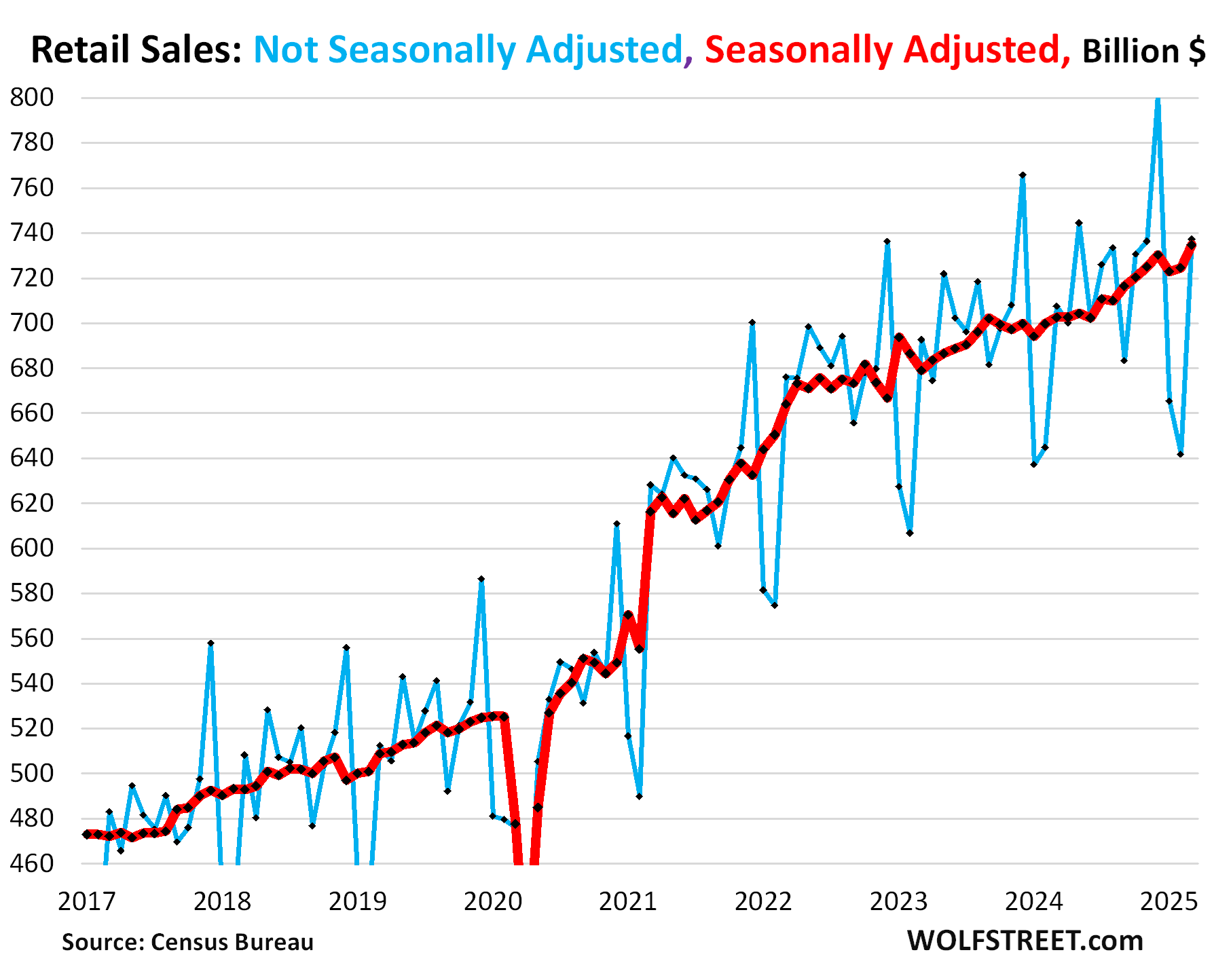
Non-frontrunning splurge: Sales at restaurants and bars. Food services and drinking places include everything from cafeterias to restaurants and bars. It’s the third largest category of retailers behind auto & parts dealers and nonstore retailers (mostly ecommerce). It accounts for 13% of total retail sales.
Most of this is discretionary spending, money that consumers want to spend, but don’t have to spend. And it’s unrelated to tariffs and any efforts to frontrun the tariffs.
Not seasonally adjusted, sales at these establishments spiked by 15.8% in March from February, to a record $102 billion.
Seasonally adjusted, they jumped by 1.8% for the month to $98 billion, and were up 4.8% year-over-year.
Our Drunken Sailors, as we’ve come to call them facetiously and lovingly, are back on track. Maybe widespread bad weather kept them at home in January and February, but they splurged when the sun came out in March. And it had nothing to do with frontrunning tariffs:
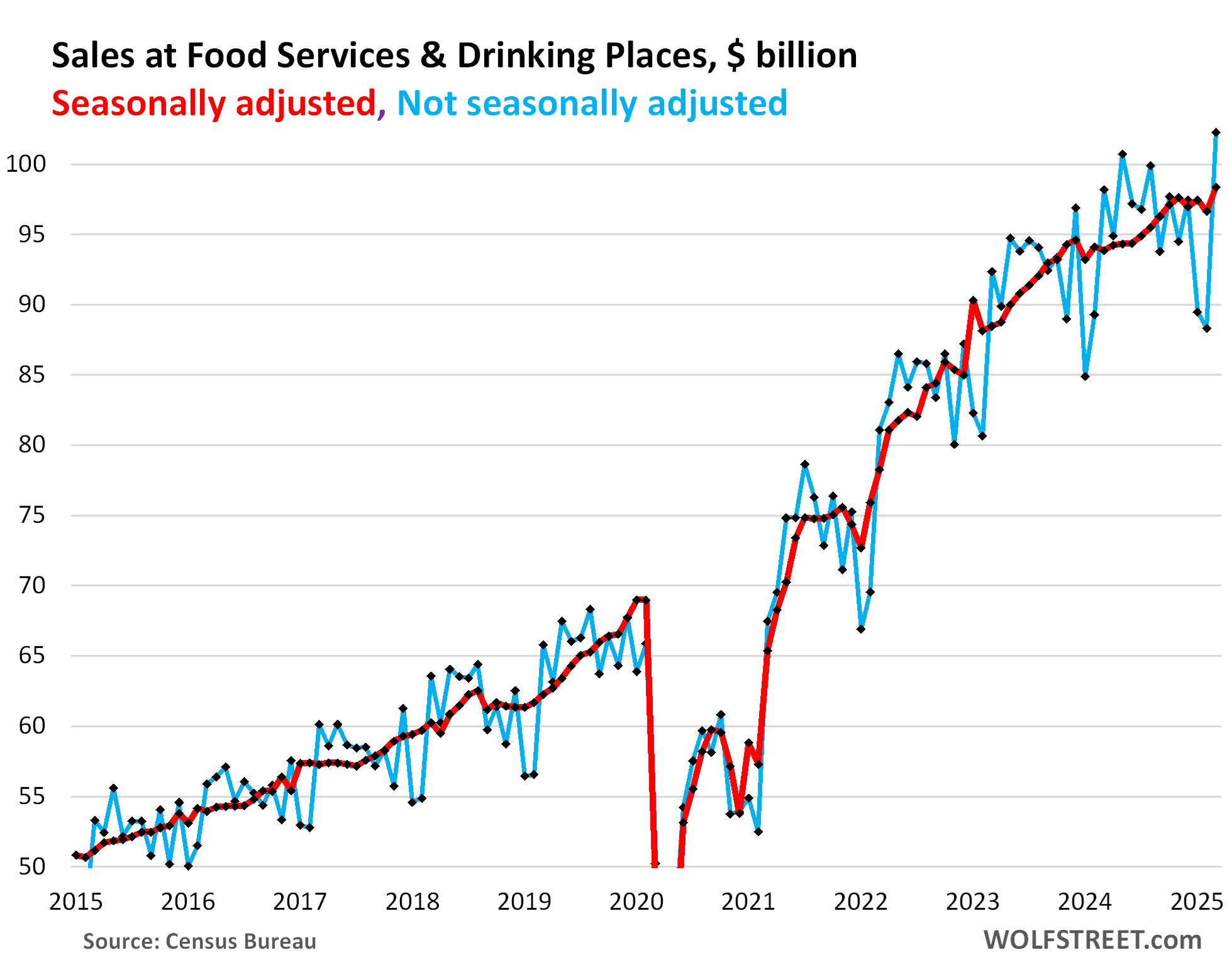
Tax-refunds & frontrunning surge: New and used vehicle dealers and parts stores, the largest retailer category with 19% of total retail sales, had a big month.
Not seasonally adjusted, sales spiked by 24% in March from February, to a record $154 billion. March is often the best month of the year; February and January are by far the worst months of the year. Year-over-year, sales spiked by 9.8% (blue in the chart below).
Seasonally adjusted, sales surged by 5.3% in March from February and by 8.8% year-over-year. Seasonal adjustments also adjust for the difference in “selling days” (red).
We knew this surge would be happening: New-vehicle sales, in terms of the number of vehicles sold, had shown decent growth in January and February and had spiked 13% year-over-year in March for the best Q1 since 2019. And sales of used vehicles also spiked 13% year-over-year in March, after solid growth in January and February.
As I pointed out, this was driven by several factors, among them:
- Big “tax-refund season”: Surging tax refunds ($208 billion through March), well ahead of a year ago, like stimulus checks for downpayments;
- Tariff-fears frontrunning;
- Urge to buy a nicer set of wheels – very ingrained in our Drunken Sailors.
And the sun came out, and they bought.
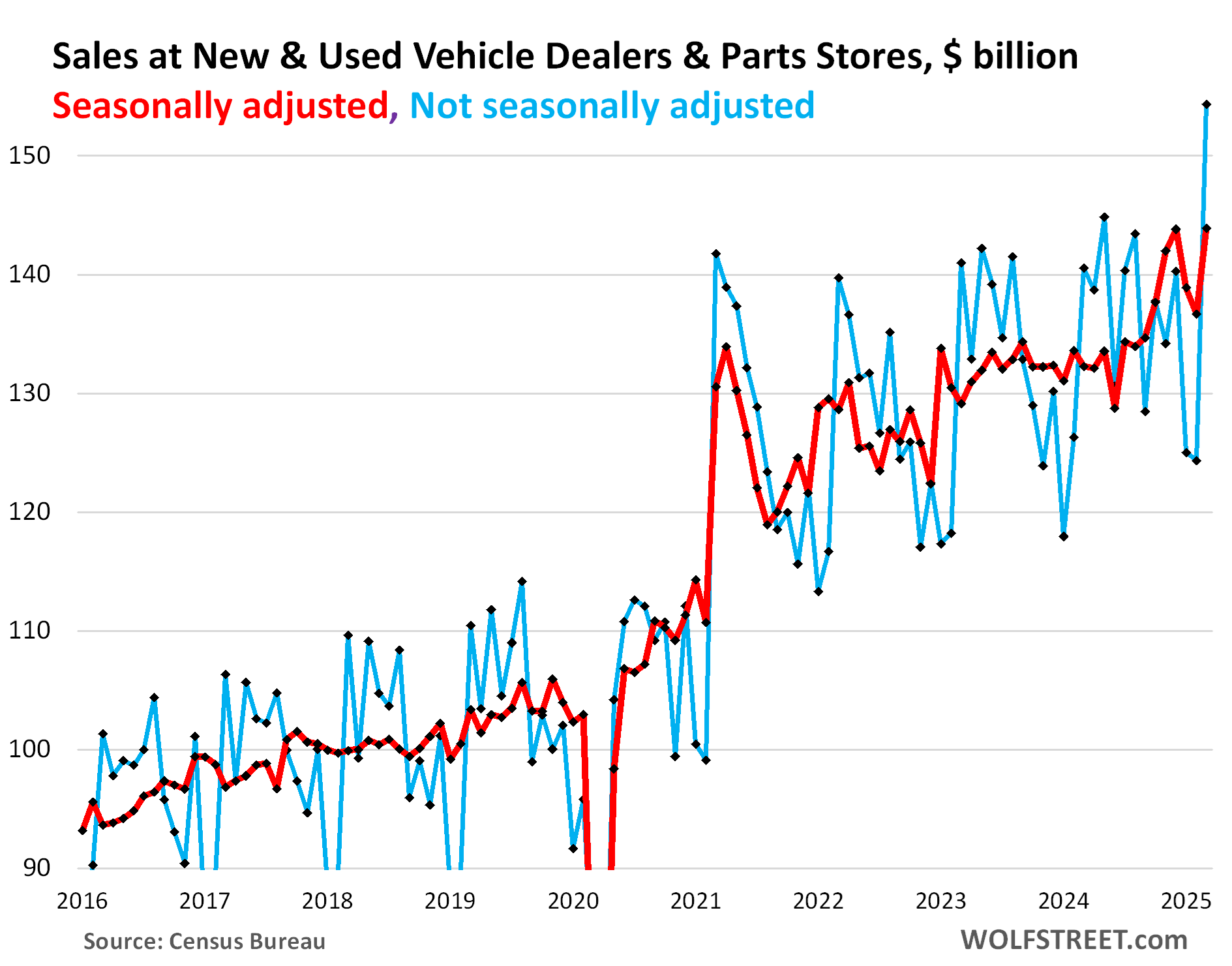
Ecommerce and other “nonstore retailers” (ecommerce retailers, ecommerce operations of brick-and-mortar retailers, and stalls and markets, #2 category), only saw modest growth.
Not seasonally adjusted, sales rose by 8.5% in March from February, and by 6.1% year-over-year, to $123 billion.
Seasonally adjusted, sales inched up 0.1% in March, and rose by 4.8% year-over-year, to $127 billion.
What, no tariff frontrunning, suddenly? Ecommerce is where tariff-frontrunning should have also taken place, but apparently it didn’t. This slow growth (for ecommerce) and the splurge at restaurants, which has nothing to do with tariffs, sprinkle doubt on just how much of a factor tariff-frontrunning really was. Maybe people were just in a mood to eat and drink out and buy vehicles? That’s what American consumers are known to do.
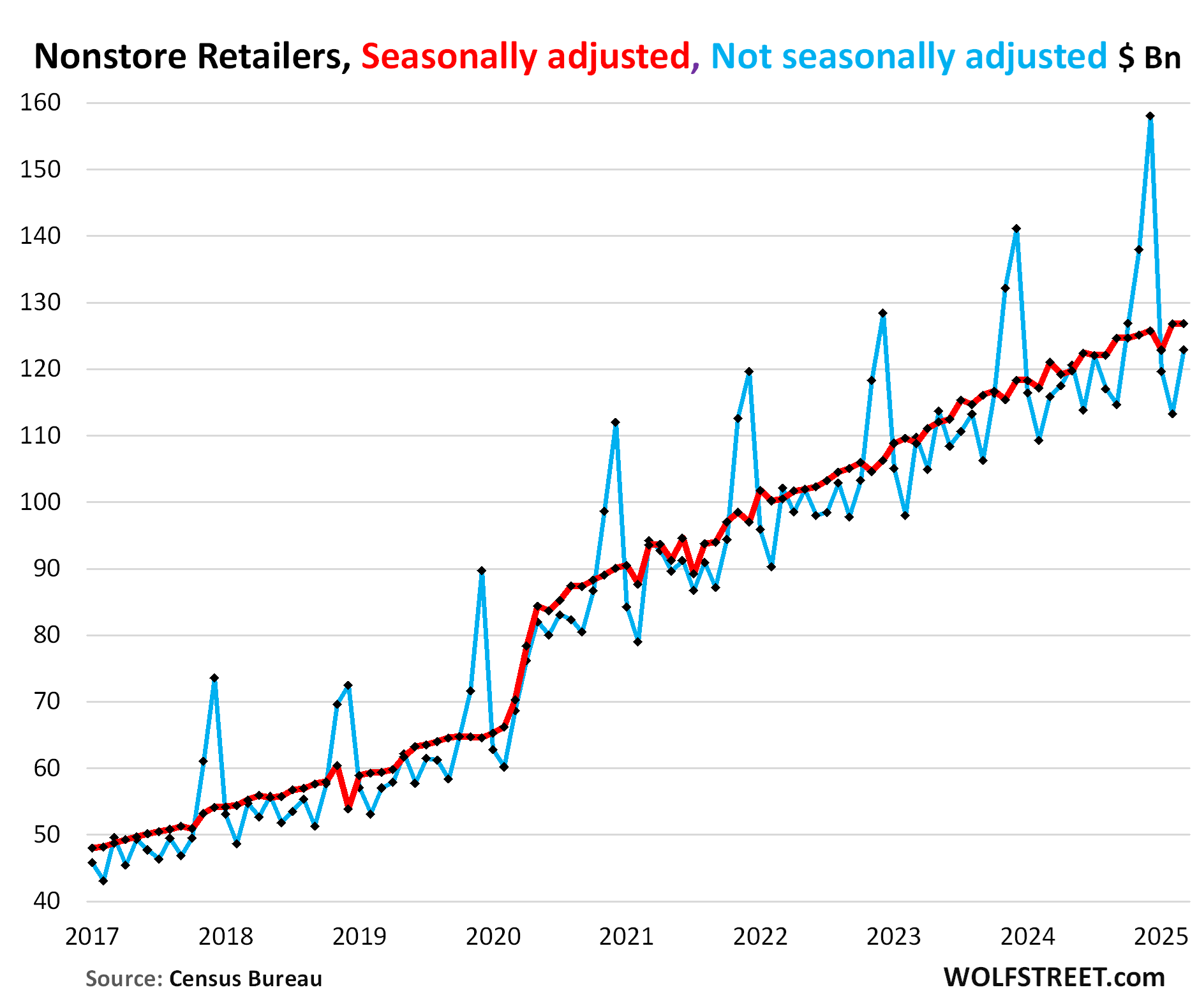
Food and Beverage Stores, #4 category of retailer, 12% of retail sales:
- Sales: $85 billion
- From prior month: +0.2%
- Year-over-year: +3.6%
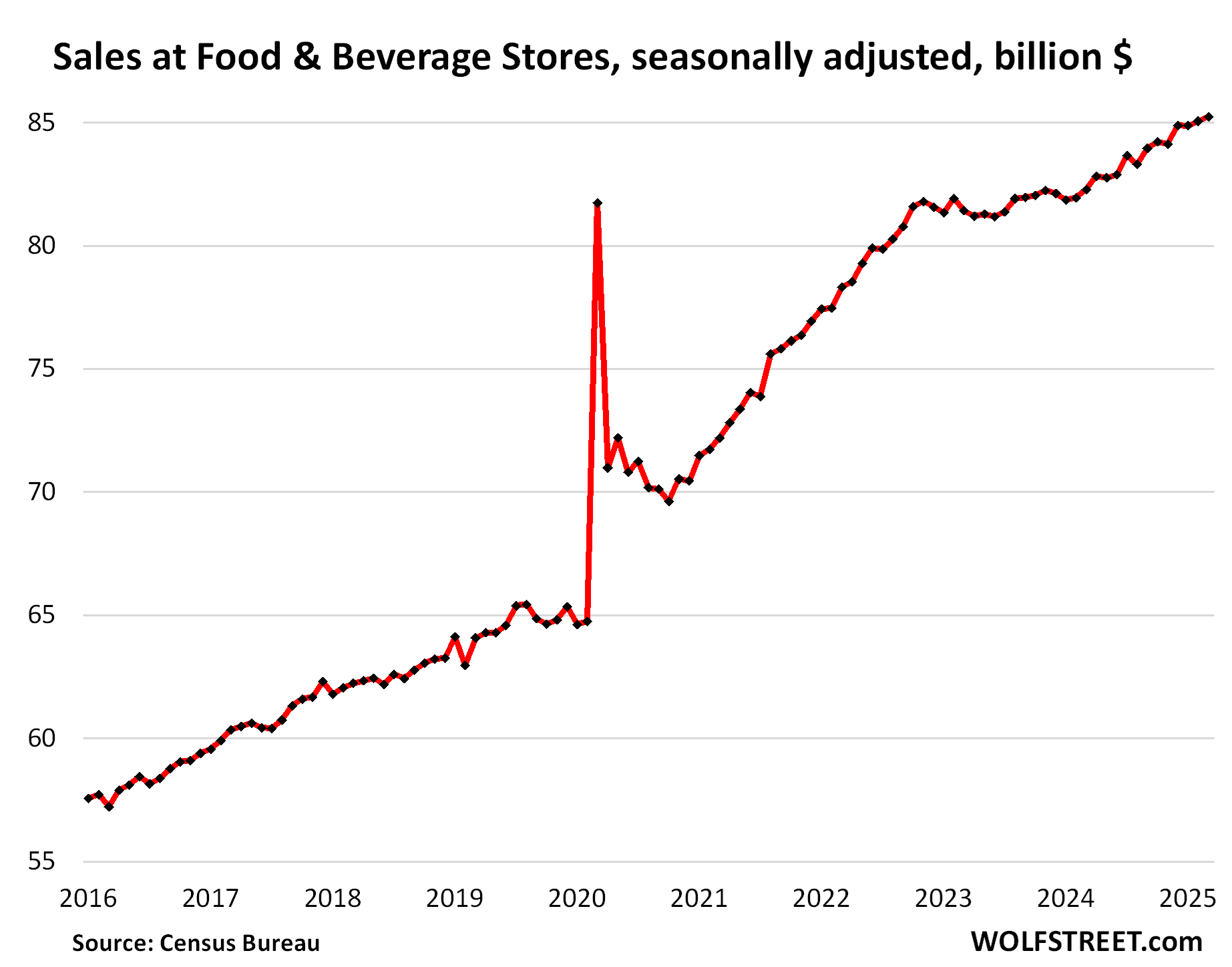
General merchandise stores, minus department stores (#5 category, 9% of retail sales), including retailers such as Walmart, which is also the largest grocer in the US.
- Sales: $67 billion
- From prior month: +0.8%
- Year-over-year: +4.8%
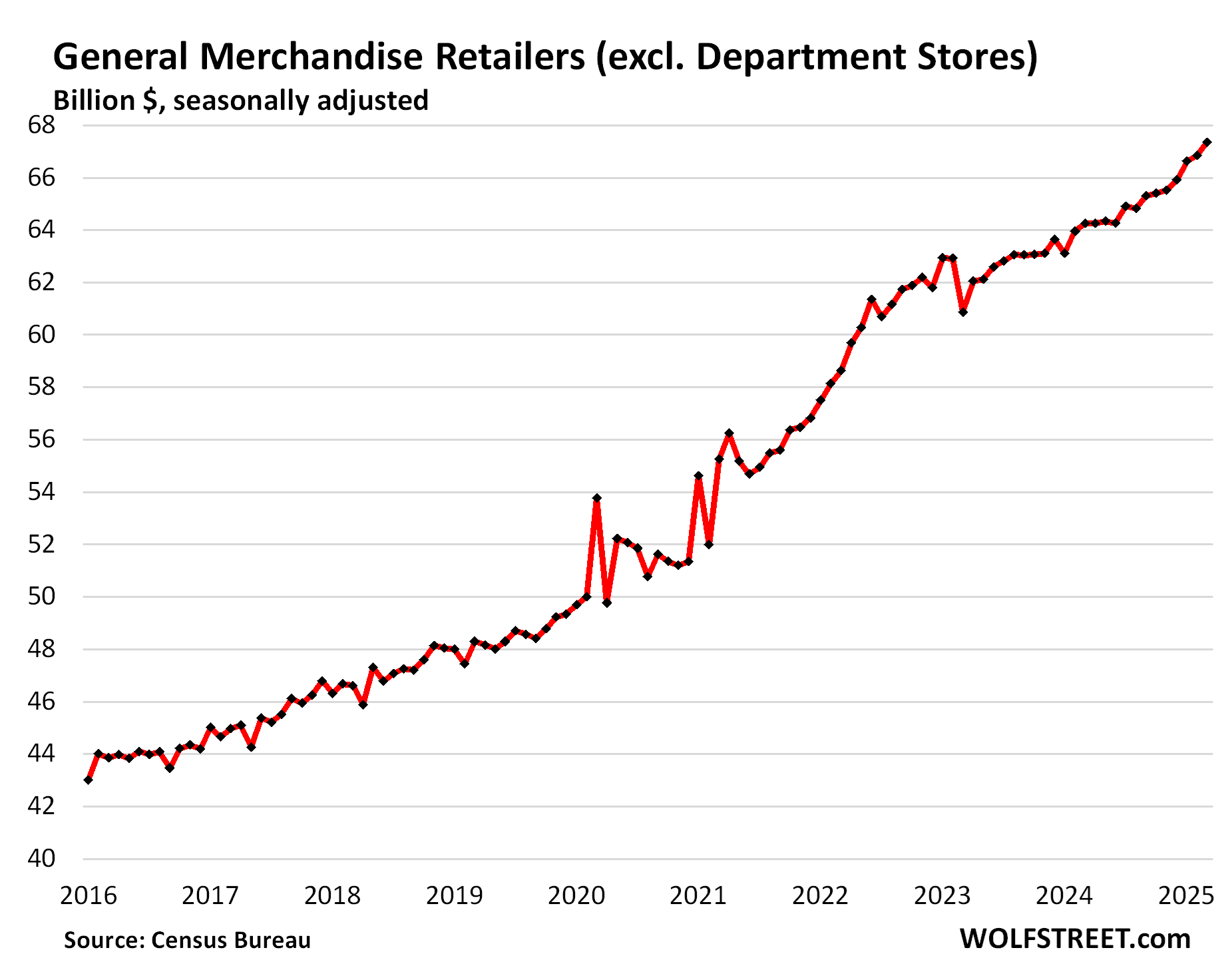
Gas stations (#6 category, 7% of retail sales). Dollar-sales at gas stations move in near-lockstep with the price of gasoline. The price of gasoline started zigzagging lower in mid-2022. These price declines pushed down dollar-sales at gas stations. Sales at gas stations also include all the other merchandise gas stations sell:
- Sales: $51 billion
- From prior month: -2.5%
- Year-over-year: -4.3%
Sales in billions of dollars at gas stations (red, left axis); and the CPI for gasoline (blue, right axis):
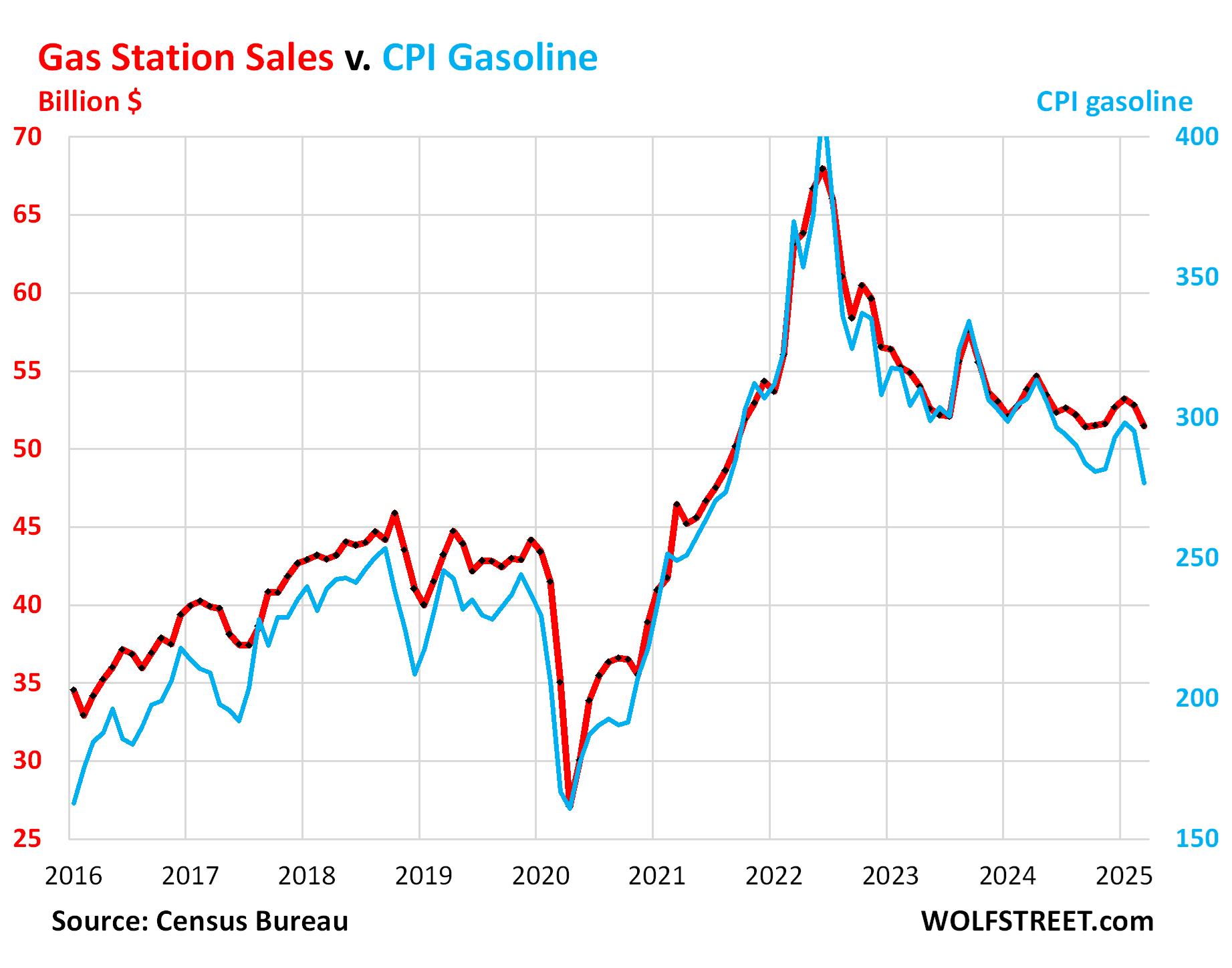
Building materials, garden supply and equipment stores (#7 category, 6% of total retail). The remodeling boom during the pandemic fizzled in late 2022, and sales fell for a while. But in March, sales spiked, even seasonally adjusted. May is usually the best month:
- Sales: $41 billion
- From prior month: +3.3%
- Year-over-year: +2.6%
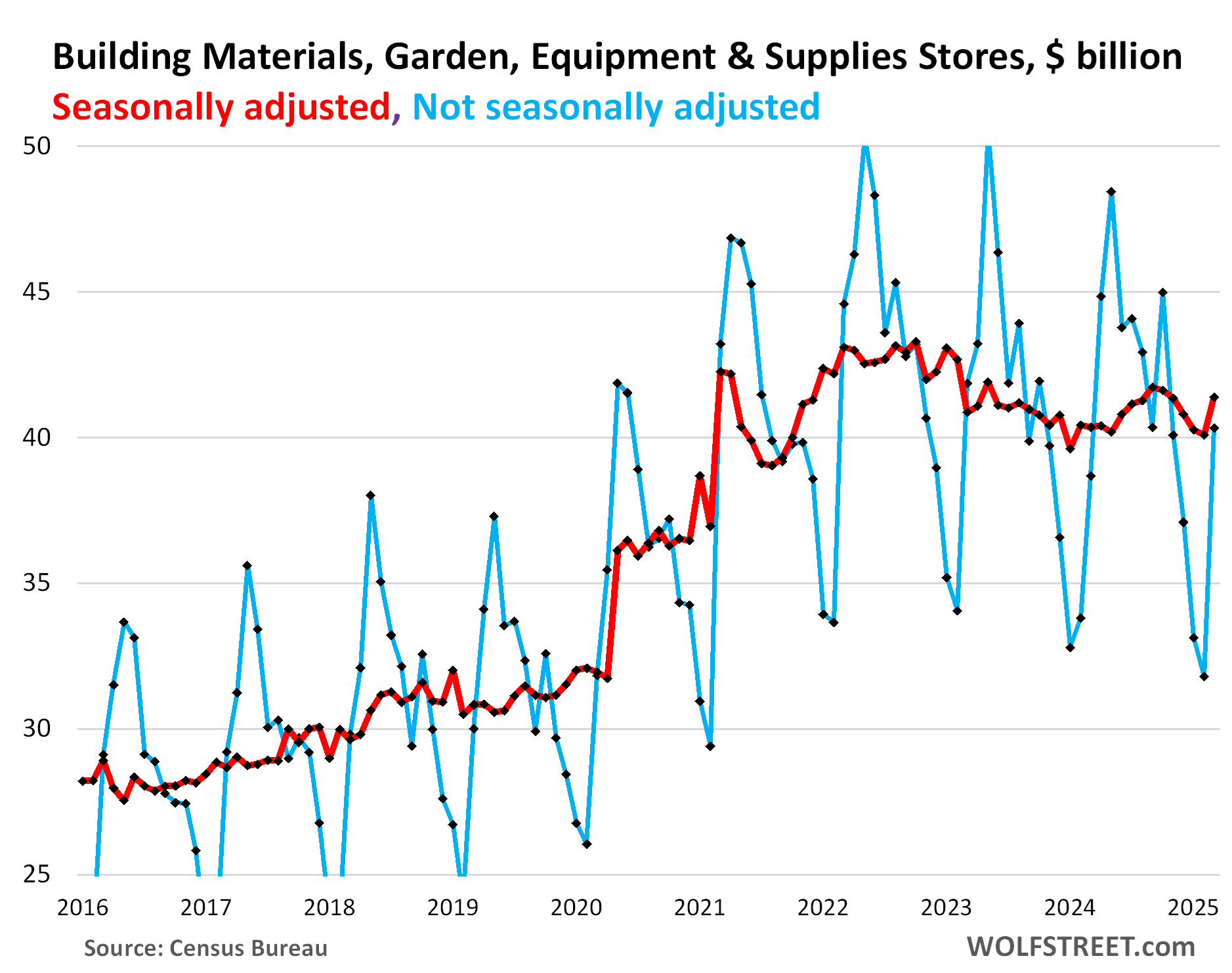
Health and personal care stores (#8 category, 5% of total retail:
- Sales: $39 billion
- From prior month: +0.7%
- Year-over-year: +7.2%
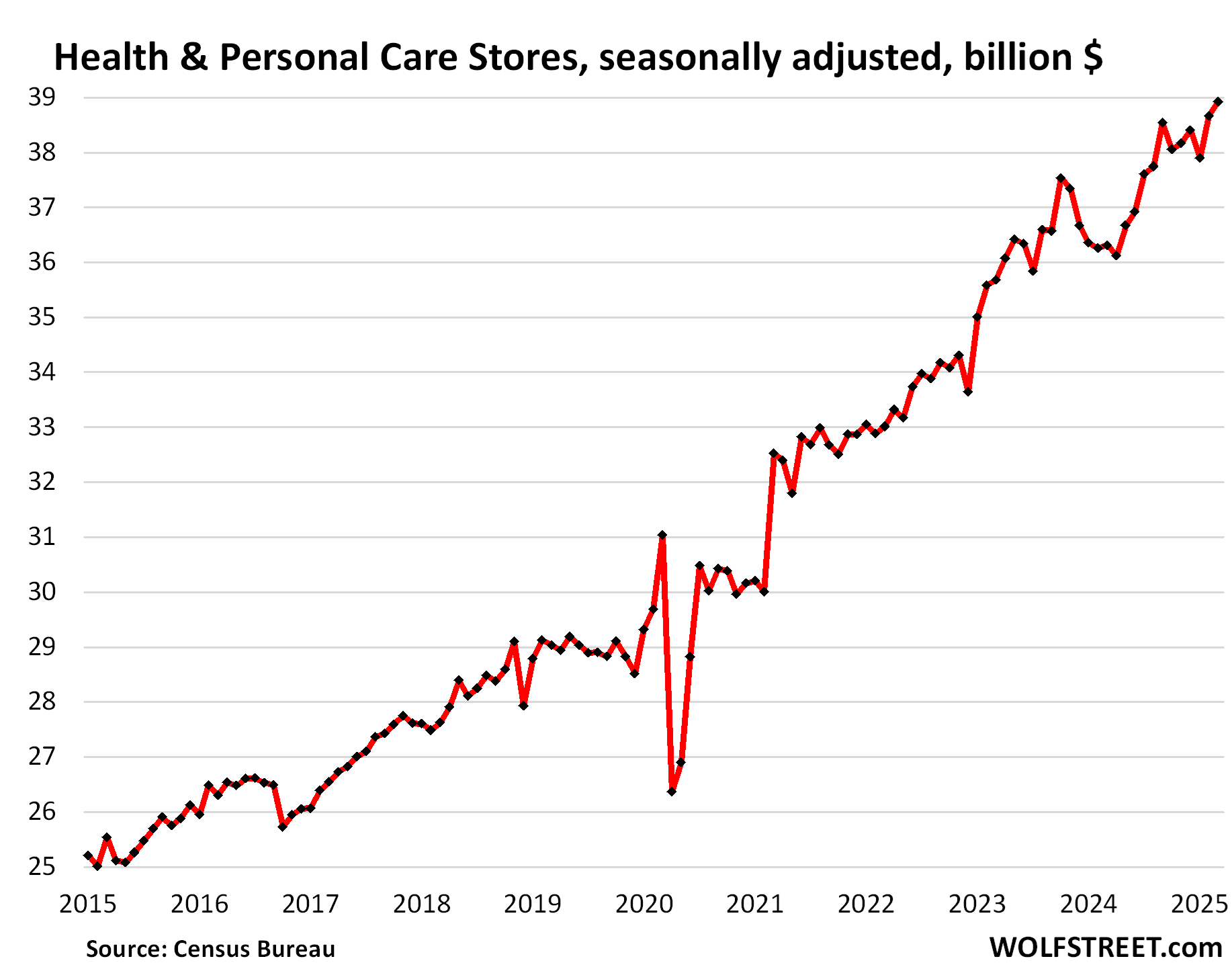
Clothing and accessory stores (#9 category, 3.7% of retail):
- Sales: $27 billion
- From prior month: +0.4%
- Year-over-year: +5.4%
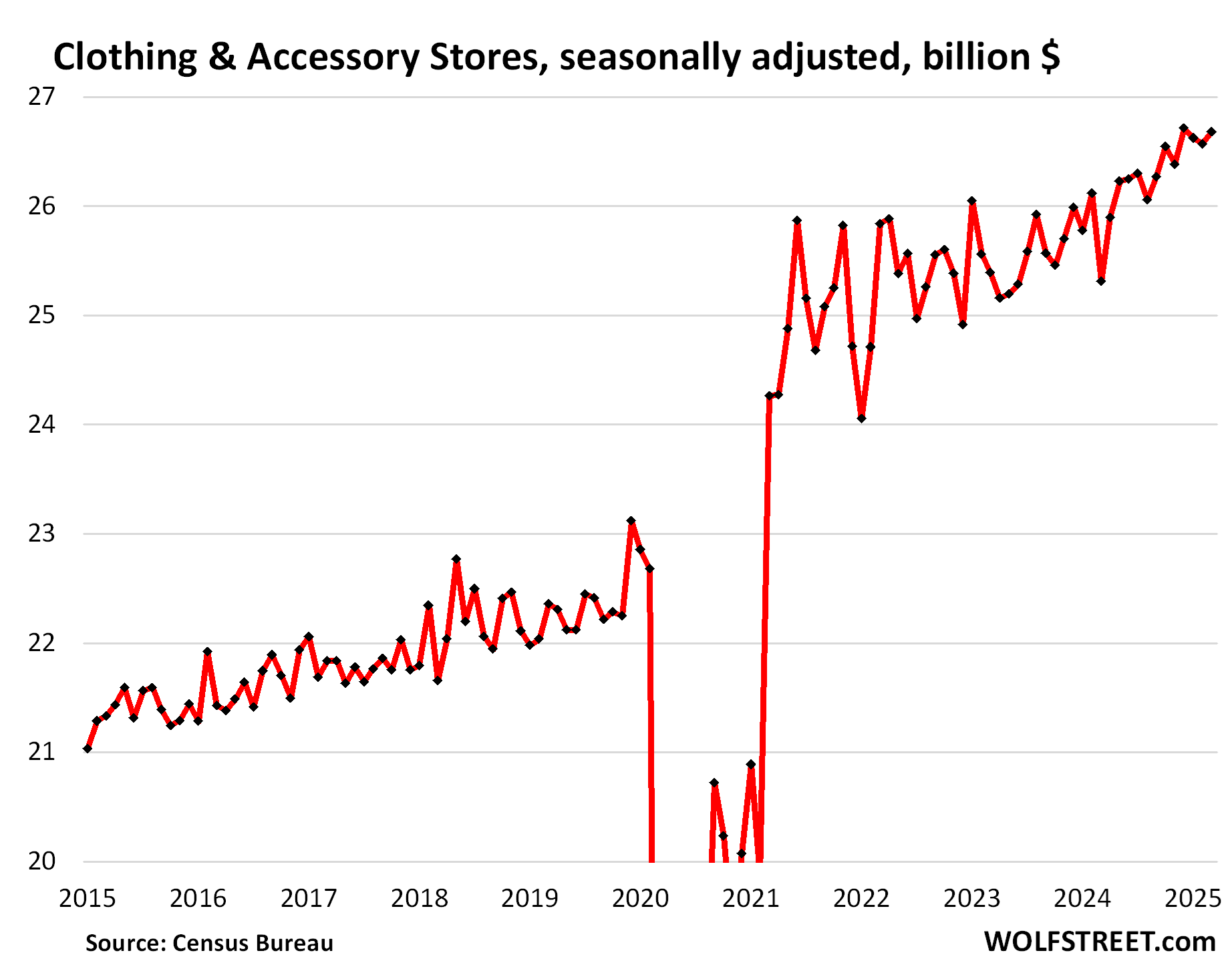
Enjoy reading WOLF STREET and want to support it? You can donate. I appreciate it immensely. Click on the mug to find out how:
![]()


Happy Easter to all. Don’t get too drunk
Howdy Folks YEA HAW. ” money that consumers want to spend, but don’t have to spend. ” Pure American atta way USA……. Now with Real Reciprocal Tariffs, sober sailors might even become drunken sailors…..
Is there evidence the average consumer frontruns tariffs? It seems to me the average American doesn’t even know what tariffs are regardless of their opinion about them. So at least in my opinion I don’t expect any changes in the numbers until the costs are passed on. Given the China tariffs don’t apply to ships in transit and it takes about 20 days for the ship to cross the ocean we’d seem to be only a few days of real tariffs hitting.
Is there reason to believe the costs won’t be passed on? Or that consumers wouldn’t decrease spending if prices increased without associated wage increases? Seems like something has to give eventually.
There is a lot of talk, citing frontrunning for the surge in auto sales, and there might have been some of it. But as you said, most consumers don’t think that way. But there are the $208 billion in tax refunds, which make great down payments, and they’re up a lot from a year ago, they’re like stimulus checks, and every year, dealers salivate over “tax refund season.” And that IS real.
Other categories of retailers, such as restaurants and bars, saw surging sales, and they have zero to do with frontrunning. And the category that should have seen a lot of frontrunning — ecommerce sales — barely ticked up, and there was no frontrunning at ecommerce retailers.
So this combination data in the article caused me to say in my article: “…sprinkle doubt on just how much of a factor tariff-frontrunning really was. Maybe people were just in a mood to eat and drink out and buy vehicles? That’s what American consumers are known to do.”
I’ve been on a quiet buyer’s strike since February, but have been spending plenty trying to beat tariffs while still trying not to give too much to this economy. So basically, just buying stuff I know I’m going to give in and buy before too long anyway.
Well, I am buying T-bills, so that is patriotic.
But my old car…keeping that.
Just want to add…it’s hard not spending after spending so much these last years. Still feel rich from all that reckless QE…(that current admin will soon be demanding more of).
Until we get a significant downswing in short-term money flows, we shouldn’t expect a recession. The next slowing can be expected with the 3rd seasonal inflection point beginning 5/5/25.
I don’t know a single person who has altered any of their buying habits as a result of the tariffs or proposed tariffs. The commenters here and elsewhere who suggest otherwise are doing so on the basis of their political bias.
Having said that, can we please get back to a semblance of normal trade with our allies and stop revoking student visas unless people are actually committing crimes? And can Congress do it’s job and present a budget that isn’t on track to bankrupt our grandchildren?
No and no,
Much more concise than I would have put it.
I went out EV shopping a few weeks ago to front run tariffs and potential upcoming changes to the federal rebates. The ones I’m interested in are flying off the lots as soon as they get in, can’t even test drive what I want to. Usually salespeople with your number blow you up. Currently a few dealerships with my number aren’t even calling me back. It’s bizarre.
You can probably hold your nose and buy any Tesla you fancy. People who have them like them, in terms of cars. Just pretend that your Tesla doesn’t have anything to do with Musk. Musk who?
Despite the plunge in Tesla sales in Q1, overall EV sales were up 10%. That means that the non-Tesla’s are flying off the lot. GM has had huge growth rates with its new models. Looks like the Koreans are getting production in the US up and running for their new models. All of them are ramping up production in the US.
Going used, a Tesla would be tempting. Maybe Musk will step down to double their potential buyers and save the company, wouldn’t surprise me.
Going new, I find the the Korean options more appealing, on paper. But who knows until you get behind the wheel. Depreciation seems extreme but I’m not finding those used deals here in the Midwest. Perhaps a one way flight to SFO…
Starting to think, what’s the rush. Even with tariffs and without a rebate, there’s a good chance supply will remain elevated and prices reasonable, and plenty more options and increased range on the horizon. My ride is older but runs great, just feeling like a drunken sailor with a ton of T bills that are treading water with inflation.
“I don’t know a single person who has altered any of their buying habits as a result of the tariffs or proposed tariffs.”
Honestly I think this is a result of the tariffs not actually affecting much quite yet. As of this morning, I can plainly see that Amazon still has all the same cheaply made Chinese products for the same low prices that were there before. So why would anyone alter their buying habits?
Add this onto the uncertainty of the tariffs themselves, which seemingly change every few days, the average consumer has no idea how any of this is actually going to affect them.
However when the price on their favorite cheaply made Chinese goods doubles or triples…
I honestly don’t even know what Powell is doing anymore besides realizing he should have never lowered rates last year because it spiked to 10 year and inflation remained stubborn.
He waited for 1 bad jobs print and totally caved last year
Powell is Chairman of the FOMC inside the Federal Reserve and is only one of twelve votes as to interest rate policy. These decisions are typically always made by unanimous vote.
Yet we are now dealing with politics. Patience brothers.
He was doing what Diaper Joe wanted, trying to sway the election.
No. The FOMC studiously weighs economic factors to set policy as to any rate decisions.
Jerome Powell is a former partner of the private equity firm, The Carlyle Group. What he did when he lowered rates last year was bailing out his Wall Street buddies.
The Bin Ladens and George Bush also had a lot of money in the Carlyle Group. The Carlyle Group bought the company that I was working for in 2005/2006.
No.
Retail sales don’t necessarily have a great track record of predicting slowdowns. They continued to grow well into the middle of dot com recession and during GFC.
I believe GDP growth was also reported to be positive in March 2008.
As long as wages of the bottom increase, it is all good. A slowdown should be acceptable if that is the only way to put money in the hands of the poor. We have screwed over the poor for far too long…..of course the Fed has had a hand to play in that.
By the poor, I assume you mean Wall Street speculators, as they are the only ones that benefit from lower Federal Reserve rates so they can borrow cheaper and speculate on more assets for increased leverage.
The Dotcom Bust started in March 2000 in the stock market. The recession started a year later, in March 2001 and lasted through September 2001. From September 2000 through Sep 2001, retail sales were essentially flat with up-and-down squiggles, and ended lower in Sep 2001 than they’d been in Sep 2000. They’re not adjusted for inflation. Consumer spending, which is adjusted for inflation, fell during that time. So stalling retail sales for more than just a few months means a recession is lurking around nearby.
the 2001 recession was a mild recession: GDP changes:
Q1 2000: +1.5%
Q2 2000: +7.5%
Q3 2000: +0.4%
Q4 2000: +2.4%
Q1 2001: -1.3%
Q2 2001: +2.5%
Q3 2001: -1.6%
Q4 2001: +1.1%
Q1 2002: +3.4%
Q2 2002: +2.5%
Those numbers are quite interesting, thank you. What’s your recall on that period of time? What was the sentiment among the consumers like?
9/11 occurred toward the end of Q3 2001, one of the two negative GDP quarters. That was huge. We were living in Manhattan at the time. The place was ghostly for quite a while. At the southern tip of Manhattan, it was a huge catastrophe. Everyone was shook up. People could play soccer on the streets. But it also unleashed a lot of economic activity by early 2002, and you can see that in the GDP numbers.
All this occurred during the middle of the Dotcom Bust, during which the Nasdaq Composite collapsed by 78% and afterwards took 15 years and lots of money printing to get back to its March 2000 high. But thousands of the individual stocks people held in their portfolios went to zero and never came back. Many leveraged investors in Nasdaq stocks lost close to 100% and had to start over again. In late 1999, I shorted some of those companies that would eventually go to zero, but I was four months too early and lost a ton of money in just days on those short trades before I covered them. At about that time, I also sold a bunch of stocks at very high prices, and that was good, including Amazon. But I kept some stocks that were solid companies with earnings, etc., and that was bad because even the strong companies lost 50%-plus of their value. Companies like Intel never recovered to their 2000 highs. It was a very ugly time for investors. Three years of T-bill-and-chill starting in late 1999 would have worked great. I did a little of it, but not nearly enough. And then in late 2022, I should have bought Amazon back for a fistful of dollars when there were rumors that it would file for bankruptcy, but I didn’t, and that was bad, LOL.
And that stock market experience impinged heavily on consumers — those with stocks, the big spenders and business decision makers and company owners — because their wealth had vanished, and their decisions on spending and business investment and employment is what caused the recession.
MW: Dow sheds 900 points, Nasdaq down 4% after Powell says Fed will keep waiting to cut rates
Powell also said that there is No Fed Put.
That is the big news of the day (month) for the stock market, although the Fed has been suggesting “No Fed Put” for a very long time. Stock market freaks are like drug addicts, they cannot accept “No” for an answer.
More importantly, for me, Powell today, according to Reuters, “noted a potentially tough situation developing for the Fed in which prices are pushed higher by tariffs while growth and possibly the labor market weaken, leaving both inflation and employment further away from the Fed’s desired levels.”
Here is Powell’s killer comment: “I do think we’ll be moving away from those goals, probably for the balance of this year. Or at least not making any progress.”
Sounds like Powell and the Fed might have to stay put (pardon the pun) on interest rates for the rest of the year. They might have to raise rates. The FOMC, except Waller, are more of a mind to deal with rising inflation than rising unemployment.
Then Powell is even more out of it than I imagined.
I don’t like Powell saying tariffs will cause inflation. Sounds like he’s shifting the blame because he and the rest of the fed voters did the trillions in money printing rate repression, so people wouldn’t have a lot of the money and cheap debt to push up prices if not for the fed. And yes they’ve done a substantial amount of QT which is good but there is still a lot more money due to them.
“Sounds like he’s shifting the blame because he and the rest of the fed voters did the trillions in money printing rate repression,”
Indeed. The Fed never once blamed QE and 0% for consumer price inflation, not even for the rampant asset price inflation. But now that tariffs might cause some inflation, they’ve got something to blame that’s not their own fault, and that’s just so much more convenient than blaming their own toolbox and decisions.
the market was down until Powell started talking, the big money took the market down a lot during the speech with extra low volume, to prey on the weak hands, then after the speech they bought heavily and took it up with super high volume. look where the market is now, has not much to do with what Powell said.
I am getting a divorce and the market is melting down 😭 at least I can still go to Applebees 🥲
I’m sorry for you, Dumbo! Divorce is no fun.
Maybe their ‘Triple Chocolate Meltdown’ will cheer you up. Better days ahead!
Wolf, does spending follow your dictum. It happens, till it doesn’t? How sudden can a change in sentiment be
If you look at the average age of the us car fleet there’s going to be an elevated amount of replacement car buying. I just had to (tranny ausgespielt on my 2002 Q45)🙁
How does gift card accounting work? My guess is they don’t count as a sale until the time it is used which given how much they are used now it might explain increases over time moving into January and February. Probably doesn’t move the needle much in any event.
From the horse’s mouth:
“How are gift certificates/cards treated? Following generally accepted accounting principles, sales from gift certificates are included in the retail sales of firms at the time the gift certificate is redeemed.”
https://www.census.gov/retail/mrts_general_faqs.html
This is living in Latin America. I would spend my wages before I got them because by the time I got paid the price of everything had gone up 10 percent or more. Americans are front running inflation!! Pretty soon they will be buying gold, land asset, etc as fast as they can. The US government is in a real pickel: raise interest rates to slow the inflation and the cost of US debt goes up, lower interest rates to reduce debt costs and inflation goes up. There is a way out but you are not going to like it!!
Exactly. Buy with a credit card and pay off the balance in a month. Inflation expectations have now gone to 3.6 percent. Americans are also expecting that the unemployment rate will increase. We’ve seen this movie before. I can’t afford gold or land anymore. But in general I’ve been front running everything since 1975!
“Most of this is discretionary spending, money that consumers want to spend, but don’t have to spend. And it’s unrelated to tariffs and any efforts to frontrun the tariffs.” – Wolf, regarding restaurants and bars.
Probably. But people might be making hay while the sun shines, or more specifically, in this case eating hay while the sun shines. You only live once, nobody gets out of here alive, so people might as well enjoy themselves while they can, realizing that the future might look grim. The grimmer it looks, the more they might want to eat, drink, and be merry. It’s kind of a doom scenario, perhaps applying mainly to main stream media addicts.
There is basically no evidence for that whatsoever
I tried that strategy, it didn’t work. I survived, and found a better way.
Barrons says “Foreign central banks, an essential group of buyers of U.S. government debt, continue to go all in on short-term Treasury bills while dumping longer-term U.S. debt at a swift pace.
For four straight months through February, central bankers abroad have sold Treasury bonds and notes, or debt that matures in over a year, the latest Treasury Department data show. It could be a sign that central bankers are more pessimistic on the long-term prospects of the U.S. ”
Well, foreigners were extremely active in the most recent 10 year and 20 year Treasury auctions. So it is difficult to know what to believe about that. As for going “all in on short-term Treasury Bills”, join the club. Me and Buffet and many commenters on this site are also members.
Also this kind of throws water on that whole theory
WOLF STREET HOT OFF THE PRESS:
Foreign Investors Massively Bought US Treasury Securities in February: China, Japan, Canada, Euro Area, UK, Financial Centers, Taiwan, India, even Brazil. Biggest increase since June 2021. And they mostly bought long-term Treasury debt. No major holder dumped.
Sorry Wolf, the last time I commented I think you tossed it in the trash can. Lumps duly taken.
My apologies as I did not mean to offend anyone with an inappropriate comment regarding someone’s intelligence quotient (not a post here, rather from another source regarding the US housing market).
However, in the land of the world wide web, there are many public comments that would lead me to a similar conclusion. I can say none are posted here on your site, so thank you, and again, my apologies.
I just look at all of the international issues very simply – the competition for the basic factors of production (land, labor, capital) and my question is, despite the “drunken soldiers” behavior you have well documented, have we already lost (deregulation, globalization, corporate manufacturing outsourcing) this battle over the last several decades?
I wish my Lava soap still had real pumice.
Wel treasuries are down at least lol
Spending at restaurants and bars –boosted by Spring Break and March Madness?
But it is up year over year. Spring break and March madness actually happen every year. Big secret
Well that is because of inflation. I didn’t know Spring Break and March Madness happen every year, thanks for telling me.
Spring break is every year, so is March madness by definition. So what was difference this year?
Are you sure, Wolf Man, that you’re not on the payroll of the Fed-R-All Reserve? Sometimes it seems so.
The Fed could easily print $1 billion out of thin air and buy WOLF STREET with it. I would then distribute $500 million to my readers, you excluded, and blow the remaining $500 million on whatever.
Tariff retaliation by Trump is making Americans swell with pride, which feeds confidence, which in turn drives euphoric retail spending. It’s driving a Trump slump on Wall Street. But a Trump bump on Main Street.
I can’t believe how many of you there are.
That the restaurant and bar sales were up 15.8% m/m not-seasonally-adjusted but only 1.8% seasonally-adjusted is clear evidence that splurging in March is a regular thing. For many of the more wealthy areas outside sunny California, there’s a big difference between February and March, making it much more pleasant to get out and party. Also, as Wolf points out, big tax refunds were coming in, an added encouragement to get the family together for a big dinner out.
Also, as a member of an investment club whose members own lots of shares in their personal accounts in addition to the club account, I must observe that in the March 20 meeting everyone but me was still buy-the-dips bullish, especially as the market was down only about 10% from the all-time high at its low a few days before, and already bouncing back up to just 8% off the all-time-high. They’ve all made huge profits in the last few years, and the recovery from the 2022 declines to new record highs has confirmed them in the belief that any market declines are just blips on the way to new all-time-highs. They’re perfectly comfortable with a portfolio average P/E near 30. Might be a little chastened this Thursday.
“That the restaurant and bar sales were up 15.8% m/m not-seasonally-adjusted but only 1.8% seasonally-adjusted is clear evidence that splurging in March is a regular thing.”
Seems you don’t understand the math here. That 1.8% increase in March from February translates into a 24% increase annualized. That’s huge. A month-to-month increase of about 0.3% would be normal. This was the biggest month-to-month increase for any month in over two years.
Retired Boomers Celebrating Stagflation?
COLA is the greatest invention ever.